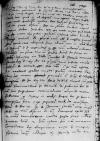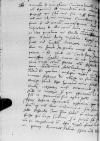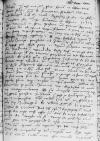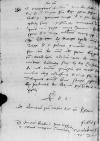1527-09-09⌊Hesterno1527-09-09⌋ sero intravi ⌊civitatem Palentianam⌋ et extra portam obviam mihi occurrit cursor et senor Mutza de Spola, Dominationis Vestrae qui mihi et ⌊Valdesio⌋ una praesentavit litteras, quas, cum ad hospitium veni, aperui. Repperi legendo, quae mihi quadrupliter accidere. Erat hospitium foetidum undique et ab omni parte obscurum. Ego, in salubro credens aliquid requiei habere, insorbui tota ista nocte nescio quid foetidi, quod hoc mane vix potui palatium ⌊caesaris⌋ adire. Tandem sumpsi animum et principem meum illustrem ⌊de Nassaw⌋ paucis, prout opus erat, allocutus sum. Demum me in aliam domum et hospitium domini ⌊de Rogendorff⌋, quod prope meum collocatur, collocavi. ⌊Waldesium⌋ in prima una cum scribis dimisi. Ita stamus in ⌊Palentia⌋. Utinam in villa ⌊Cuuillas de Zerrato⌋ – amoenior sanior locus est. Sed haec et plura immo
infinita mala patimur et merito propter peccata nostra. Quod autem asserit Dominatio Vestra, ⌊oratores Gallos⌋, ⌊Anglos⌋ ⌊Palentiam⌋ venturos,
verum, nam hoc mane prandium cum domino de Nassaw sumpserunt et ita, licet vix horis
tribus vivus cum per noctem semimortuus, quia dormiens in ⌊Palentia⌋ fui, sed non sine suspectione,
animadverti aliquid novi fabricare per ⌊caesarem⌋ et ⌊Gallum⌋. Faxit
Deus, quod honesta compositio fieret, pax sequeretur tandem. Ita
avisatum facio de hac re. Quod de ⌊Ianua⌋ scribitur, certe nihil habeo. Sed verum
hesterna die, cum ⌊Duongas⌋ oppidum simul et omnes transierimus, occurrit posta satis multis onerata litteris a domino optimo domino
nostro magno ⌊cancellario⌋ ex ⌊Barquinona⌋ missa, quae maximam congeriem
litterarum adduxit, sed penitus nulla fit mentio de amissione ⌊civitatis Ianuensis⌋. Sit, quod omnino figmentum et
mendacium credo. Illos ⌊Gallos⌋ finxisse, qui siliam ausi sunt et semper facere. S[c]ribit
ad me idem noster ⌊magnus cancellarius⌋, quod voto fovit se ad montem ⌊Montisserrati⌋ ⌊Divam Virginem⌋ ...
visitaturum et illuc novem diebus permansurum et voto persoluto in sacello ⌊Montisserrati⌋, ubi spatio novem dierum residebit. Expost gressus suos ad ⌊caesarem⌋ diriget, velit Deus, quod bene et sancte, ita scribit mihi bonus
⌊dominus patronus et pater⌋, unde non credo iterum ⌊Ian[uam]⌋ amissam. Hodie mane cum ad palatium irem, venit mihi obviam ⌊frater⌋ nostri ⌊Erhardi⌋ capitanei locumtenens
hallebardierensis
et mihi nuntium hoc praebuit ⌊archiepiscopum Rygensem⌋ in ⌊Toga macta⌋ hesterna die obiisse et finem vitae suae clausisse. Unde ego ⌊Henricum⌋ meum scribam iussu dominorum adstatim misi ⌊Toremade⌋ pro litteris omnibus et negotiis, si quae spectarent ad ⌊maiestatem⌋ suam et
concernerent suae maiestatis statum. Audio praefatum ⌊Erhardum⌋
executorem testamenti, ut fertur, quod omnia bene ordinaverit. Sic fatuus ille ⌊Erchardus⌋ iam
pretio habetur cum nemo alius fuisset, qui onus subiret. Sic
scripsi ⌊sibi⌋, quod non sit negligens, cum ⌊episcopus Rygensis⌋ fuerit dives et parcus, denarios habuit. Spero eundem ⌊Erhardum⌋ diligenter Tast mit zu, prout homines et executores facere solent.
Quod de ⌊Hungaria⌋ scriberem
libenter ad longum omnia, sed male dispositus pro hac vice solum
cursorie haec: ⌊rex⌋ Hungariae et ⌊Bohemiae⌋ 30 Iulii exsequitur ⌊Wiennam⌋ in propria persona cum potenti exercitu et tertia die ad confines regni Hungariae devenit, et ibidem per status regni
Hungariae, uti verus rex et dominus eorum exceptus, receptus,
approbatus est, ut rex statibus regni in Claro Campo praestitit eis iuramentum solitum et consuetum, et expost per huiusdem status in
regnum Hungariae magnifice traductus est, und den ersten Tag Augusti gen ⌊Altemburg⌋, quod ita vocant scriptores, cum toto exercitu pervenit, et
ibidem prius ⌊capitaneus Casimirus⌋ se cum toto exercitu regi ostendit cum multis, infinitis proceribus et dominis ⌊Hungaris⌋, ⌊Bohemis⌋ et
⌊Alemanis⌋. Concilium habuerunt. Consedentibus illis simul venit nuntium, ut ita dicam, divinum: iam ⌊reginam⌋ ⌊principem⌋ peperisse et
iuvenem regem, et fuit natus prima die Augusti intra XI et XII. Totus populus, primo
⌊rex⌋, repleti maximo gaudio, illico die dominica sequenti iuvenis ⌊rex⌋ baptisatus et nomen eius Maximilianus, et sic magis animatus rex in propria persona ⌊Hungariam⌋ (post se derelinquens pricipes) ingressus. Alias credunt ⌊suam maiestatem⌋ in propria persona vix intrasse etc. Et ulterius progressi vi ceperunt castrum et civitatem ⌊Rab⌋, ubi optimus episcopatus est und zuncht den nesten auff offen zu das er auch inhatt und kompt der ⌊Wayda⌋ nit so wurt er gesucht und fuerer sein nit geschondt, etc. 1527-09-10⌊Isto1527-09-10⌋
mane venerunt aliae litterae, quas non aperui, quia tot mihi sunt curae et negotia, quod vel cuperem me esse apud Dominationem Vestram, vel in villa mea. Hic nulla requies et carofora hic omnia venduntur, nec hic habetur lign[um, si] tamen Dominatio Vestra cupit hic esse, spero hospitium habebimus.
Parcat mihi Dominatio Vestra, quia dolore repletus sum. Mitto annexas
litteras, quas in posta mea inveni et tamen spero Dominationem
Vestram nuper multas recepisse litteras, quas ⌊Ehinger⌋ ex ⌊
Duonga
⌋ oppido misit. Rogo, Dominatio Vestra salutet ⌊commatrem⌋ et totam
familiam. Hic nihil adhuc potui expedire, cum tarde heri adveni,
nec de mea infirmitate liberatus sum, sed Deus custodiat me, ut hic nos omnes. Quiescam ista nocte fortasse melius. Deus altissimus
Dominationem Vestram et fratrem ⌊Bernhardum⌋, reliquos omnes bene sanos conservet. Amen.



